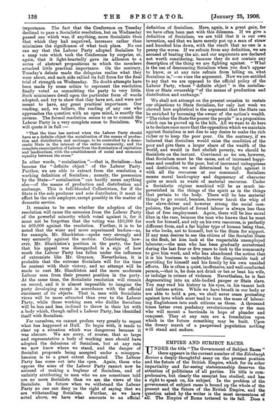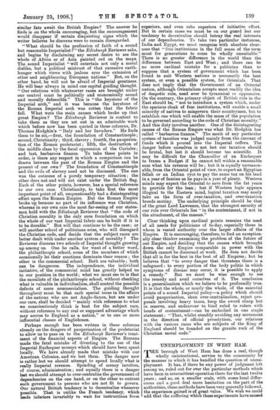EMPIRE AND SUBJECT RACES. u NDER the title "The Government of
Subject Races" there appears in the current number of the Edinburgh Review a deeply thoughtful essay on the present position and the future of the British Empire, which for its sober impartiality and far-seeing statesmanship deserves the attention of politicians of all parties. Its title is com- prehensive, but clearly the essayist has studied, and has a right to speak on, his subject. In the problem of the government of subject races is bound up the whole of the present and the future of the British Empire, and the question asked by the writer is the most momentous of all. The Empire of Rome tottered to its fall. Does a similar fate await the British Empire? The answer he finds is on the whole encouraging, but the encouragement would disappear if certain disquieting signs which the writer believes he discerns were to remain disregarded.
"What should be the 'profession of faith of a sound but reasonable Imperialist?" the Edinburgh Reviewer asks, and begins by disclaiming any secret desire to see the whole of Africa or of Asia painted red on the maps. The sound Imperialist "will entertain not only a moral dislike, but a political mistrust of that excessive earth- hunger which views with jealous eyes the extension of other and neighbouring European nations." But, on the other hand, he will not be afraid of Imperial greatness. He will bear always in mind one capital guiding thought. "Our relations with whatsoever races are brought under our control must be politically and economically sound and morally defensible." This is "the keystone of the Imperial arch," and it was because the keystone of the Roman Imperial arch was rotten that the fabric fell. What were the main causes which broke up that great Empire ? The Edinburgh Reviewer is content to take them as they are set out in an admirable work which before now has been quoted in these columns, Dr. Thomas Hodgkin's "Italy and her Invaders" He finds them to be six,—first, the foundation of Constantinople; second, Christianity ; third, slavery ; fourth, the pauperisa- tion of the Roman proletariat ; fifth, the destruction. of the middle class by the fiscal oppression of the Curiales ; and last, barbarous finance. To take these points in order, is there any respect in which a comparison can be drawn between the past of the Roman Empire and the present of our own ? The foundation of Constantinople and the evils of slavery need not be discussed. The one was the outcome of a purely temporary situation ; the other does not and will not exist under the British flag. Each of the other points, however, has a special reference to our own case. Christianity, to take first the most important point of all, unquestionably had a disintegrating effect upon the Roman Empire. But the Roman Empire broke up because no part of its influence was Christian, whereas in our own case the most far-seeing of our states- men hold with the Edinburgh Reviewer that "the code of Christian morality is the only sure foundation on which the whole of our vast Imperial fabric can be built if it is to be durable." But will that continue to be the case; or will another school of politicians arise, who will disregard the Christian code, and decide that the subject races are better dealt with under another system of morality ? The Reviewer discerns two schools of Imperial thought growing up among us. One he calls, for want of a better word, the philanthropic school, some of the members of which occasionally let their emotions dominate their reason ; the other is the commercial school. Both are valuable ; both can be dangerous. The independence, the individual initiative, of the commercial mind has greatly helped us to our position in the world; what we must see to is that the moralists of the philanthropic school, without checking what is valuable in individualism, shall control the possible defects of mere commercialism. The guiding thought throughout must be that each special issue in the affairs of the nations who are not Anglo-Saxon, but are under our care, shall be decided "mainly with reference to what we conscientiously think is best for the subject race, without reference to any real or supposed advantage which may accrue to England as a nation," or to one or more influential classes of Englishmen.
Perhaps enough has been written in these columns already on the dangers of pauperisation of the proletariat to allow us to pass on to the Edinburgh Reviewer's treat- ment of the financial aspects of Empire. The Romans made the fatal mistake of diverting to the use of the Imperial Exchequer moneys which should have been spent locally. We have already made that mistake with our American Colonies, and we lost them. The danger now is rather lest we should attempt to spend locally what is really Imperial revenue. Spending of money involves, of course, administration ; and equally there is a danger lest we should attempt to over-centralise the government of dependencies on the one hand, or on the other to entrust such government to persons who are not fit to govern. Our natural British tendency is to decentralise whenever possible. That is unlike the French tendency, which leads inferiors invariably to wait for instructions from superiors, and even robs superiors of initiative effort. But in certain cases we must be on our guard lest our tendency to decentralise should betray the real interests of our dependencies. To take two particular instances, India and Egypt, we must recognise with absolute clear- ness that "free institutions in the full sense of the term must for generations to come be wholly unsuitable." There is no greater difference in the world than the difference between East and West ; and there can be no more cardinal mistake for a politician than to suppose that a system of government which has been found to suit Western nations is necessarily the best system, or even a possible system, for Orientals. That does not imply that the Government of an Oriental nation, although Orientalism accepts most readily the idea of despotic rule, need ever be tyrannical or oppressive. On the contrary, the primary object of British rule in the East should be, "not to introduce a. system which, under the specious cloak of free institutions, will enable a small minority of natives to misgovern their countrymen, but to establish one which will enable the mass of the population to be governed according to the code of Christian morality." And this duty involves another. One of the disintegrating causes of the Roman Empire was what Dr. Hodgkin has called "barbarous finance.' The merit of any particular system of taxation was judged mainly from the amount of funds which it poured into the Imperial coffers. The danger before ourselves is not lest our taxation should be brutal, but lest it should become too scientific. It may be difficult for the Chancellor of an Exchequer to frame a Budget if he cannot tell within a reasonable sum what his revenue will be ; but it is equally unreason- able, from the Oriental point of view, to expect an Egyptian fellah or an Indian ryot to pay the same tax on his land in a year of famine as he pays in a year of plenty. Western minds may expect the Oriental to save from the fat years to 'provide for the lean ; but if Western logic appears illogical to the Eastern mind, logical taxation may easily take on the form of over-taxation, and over-taxation breeds mutiny. The underlying principle should be that of the great Lord Lawrence, that the strongest security of our rule over Orientals lies "in the contentment, if not in the attachment, of the masses."
Clear thinking upon cardinal points remains the need of all needs for politicians of to-day, especially those in whom is vested authority over the larger affairs of the Empire. It is encouraging, therefore, to find an exception- ally clear thinker examining the problem of the future of our Empire, and deciding that the causes which brought down the only Empire comparable in power with the British cannot be discerned at work. He does not decide that all is for the best in the best of all Empires ; but he believes that "to every danger that threatens there is a safeguard : to every portion of the body politic in which symptoms of disease may occur, it is possible to apply a, remedy." But we must be wise enough to see the remedy and avail ourselves of it. The conclusion is a generalisation which we believe to be profoundly true. It is that the whole, or nearly the whole, of the essential points of a sound Imperial policy—a policy which should avoid pauperisation, shun over-centralisation, reject pro- posals involving heavy taxes, keep the sword sharp but in reserve, and endeavour to bind ruled to rulers with bonds of contentment—can be embodied in one single statement : "That, whilst steadily avoiding any movement in the direction of official proselytism, our relations with the various races who are subjects of the King of England should be founded on the granite rock of the Christian moral code."





















































 Previous page
Previous page